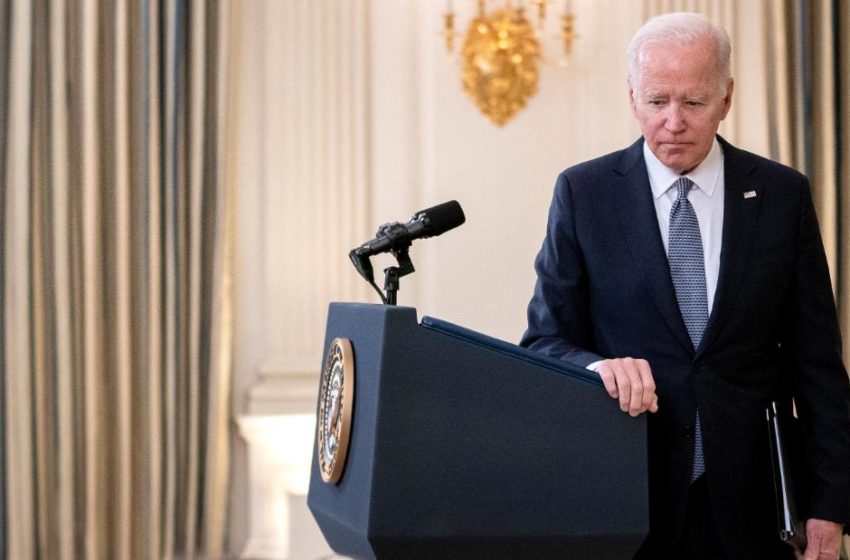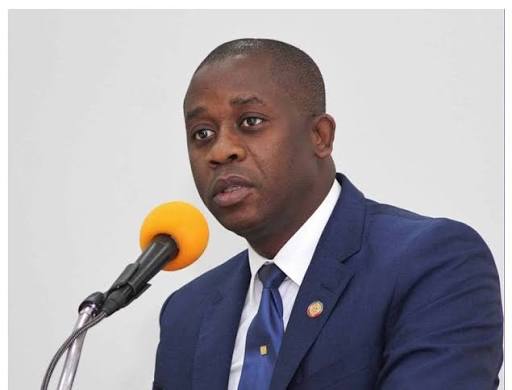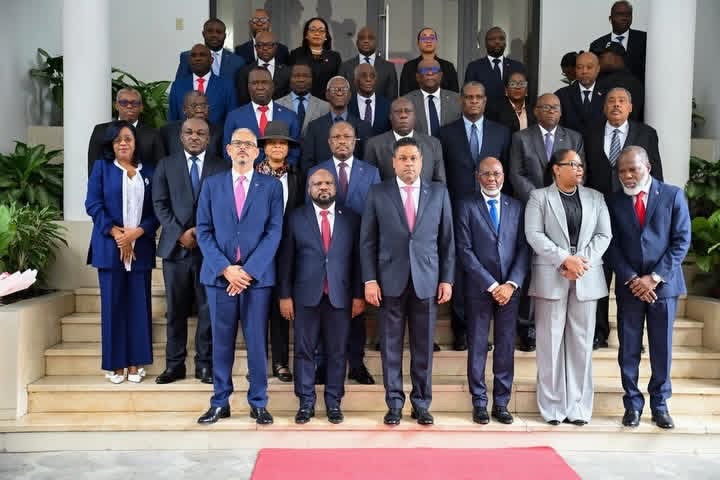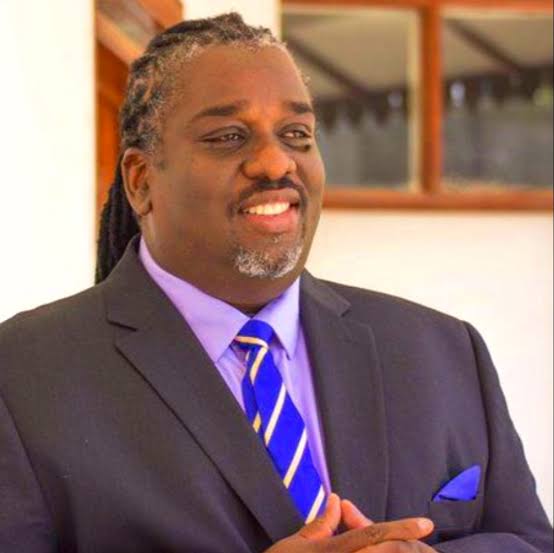If the presidency seemed then like a natural fit for a 50-year creature of Washington, today its limits are leading to a reckoning over expectations and ambitions in a country as exhausted, angry and divided as ever.
“There are successes that he’s had, but people do not feel it and you can’t persuade people to feel better. You can’t jawbone that,” said David Axelrod, a senior adviser in former President Barack Obama’s White House and a CNN senior political commentator.
Unlike Trump, Biden is not actively stoking the anger. But his inaugural speech pledge to “end this uncivil war” remains unfulfilled.
Biden’s trademark personal style — wielded over breakfasts in Delaware, inside caucus rooms on Capitol Hill and across the Resolute Desk in the Oval Office — hasn’t brought around holdout Democrats to some of his boldest ideas, let alone many Republicans.
On a personal level, just adjusting to life in the White House has been a struggle. By his own admission, Biden finds the place stifling and regularly spends three nights a week elsewhere.
Blame game
Even as top advisers and longtime friends of Biden try to help reset a floundering presidency, recriminations have quietly surfaced inside the West Wing about the fundamental causes of the challenges.
A considerable share of finger-pointing is aimed at deep divisions among Democrats and how some top officials have sought to accommodate progressives in hopes of keeping peace inside the party.
“Over the last year, the White House has allowed the left to hijack and misinterpret the rationale for Biden’s election,” said one former Democratic official in regular touch with the President, speaking to CNN on condition of anonymity to talk candidly about the West Wing. “He was not elected to transform the country.”
White House chief of staff Ron Klain, a longtime Biden adviser, is at the middle of those internal tensions. He is seen by some observers as pushing his own agenda or being too quick to side with demands from liberals, which raises expectations that ultimately lead to disappointment.


“They pushed for everything you would have thought they would have done if they had 58 or 60 Democrats,” one lawmaker told CNN, who lamented how Biden’s first year is ending with a focus on what he didn’t accomplish rather than what he did.
“Either your message is wrong, or your approach is wrong. Something is wrong.”
At the center of the White House challenges, though, is Biden himself and what even many longtime admirers describe as unremarkable and uneven performances. Several members of Congress who speak with Biden frequently told CNN that his grasp of details is impressive, but how he communicates that publicly is often anything but.
That promise, however, rings familiar. The administration has repeatedly promised that Biden would spend more time on the road selling his plans, yet he has traveled less than most recent predecessors.
“There should be some really significant issues that we should be able to come around and coalesce around and get done. And I think we can. I think we can get it done. And we need the President, we need the administration to lead the way. They’re in charge. The buck stops there. There is no doubt about, and we need to get things done. We’re not doing good enough,” said Rep. Tim Ryan, an Ohio Democrat who is running for Senate in the state.
“The President is the President, and there is no question that he bears some responsibility for it. But there is also Congress and the Senate, and the Republicans are MIA. They’re worthless,” Ryan said on CNN.
White House press secretary Jen Psaki on Tuesday hailed the legislative successes and the economic strides, despite coming into office under what she described as “an incredibly difficult circumstance.”
“You don’t get everything done in the first year,” Psaki said. “The work is not done. The job is not done, and we are certainly not conveying that it is.”
Confronting Covid
Biden has made significant strides, particularly in getting hundreds of millions of Americans vaccinated. But millions still refuse to get shots, a persistent source of frustration for the President.
“This virus has fooled us multiple times,” one senior health official told CNN. “Nobody expected Delta to just blow us away. And then to have Omicron come out of nowhere, it’s a big, big surprise.”
Still, the President has maintained the same mentality throughout. He has repeatedly advised his team that while outsiders will quickly point out any of their missteps, “you should keep your head down and keep working.”
“He’s not panicking. He’s not blaming anyone,” the official said.


In other ways, the pandemic has altered the normal rhythms of executive branch life. Unable to travel as extensively as he’d once hoped, Biden has taken to conducting events from an elaborate stage-set built in a White House auditorium where participants can beam in on video-chat. He has traveled abroad only twice, a slower pace than his predecessors.
“You know what it takes to go meet with the President?” said Health and Human Services Secretary Xavier Becerra last month. “It’s just a pain. And you knock out so much of your day. You’ve got to get tested, what is it, an hour and a half before you can see the President, you got to hang around there. So, the actual physical one-on-one, not as often.”
Calls for a reset
Biden’s speeches often rely on the same lengthy passages, recited verbatim from a teleprompter. When he does leave Washington, his events have tended to adopt a familiar look: a tour of a factory or plant, a speech to a group of unionized workers and up to an hour of shaking hands afterward. His top-visited state, aside from Delaware where he travels home on weekends, was Pennsylvania.
After urging from party strategists, Biden has lately begun drawing sharper contrasts with Republicans and speaking out louder about the corrosive lies peddled by Trump. The President has begun staging more events meant to highlight the benefits of what he has been able to accomplish, like passing the largest public works bill in decades.


Heading into the new year, the White House has drawn up executive actions on issues like police reform for Biden to act where Congress won’t.
And White House officials and Democratic lawmakers are beginning to quietly plot a way forward on Biden’s sweeping spending agenda, including potentially splitting it into pieces.
His top aides insist Biden’s achievements have been squarely focused on improving conditions for the working class.
“I would not say that the Democratic Party has turned its back on the working class. We have had historic successes in the first year of the Biden presidency, the passage of the American Rescue Plan, to give one example, has cut child poverty in this country almost in half,” said Susan Rice, Biden’s domestic policy adviser, last week on CNN. “We have put very important supports in the pockets of the American people at a time when the pandemic has made their economic prospects perilous.”
Managing expectations
In many ways, Biden’s first year was defined by expectations getting away from him: about the trajectory of the pandemic, the durability of Trump and the ability of a governing veteran to find solutions to any of it. At junctures throughout the year, Biden appeared caught by surprise when challenges arose that, at least in retrospect, were not surprising.


Repeatedly appearing caught off-guard by events undercut Biden’s promise of restoring competence to government and predictability on the world stage and led to accusations he was being poorly served by his team. It belied a President who, behind the scenes, solicits a wide range of opinions on critical issues and engages a panel of advisers inside and outside government. The process has sometimes delayed critical decisions, giving the impression of indecisiveness.
After the harrowing Afghanistan ordeal, there were calls to fire his national security adviser Jake Sullivan. Others have urged Biden to replace his Covid response coordinator Jeff Zients. After publicly sinking prospects for quick passage of the Build Back Better plan, Democratic Sen. Joe Manchin of West Virginia vented frustration at White House staff he said drove him to his “wit’s end.”
Whether Biden plans to replace anyone in the new year remains to be seen; he is a known deliberator and hasn’t executed any major personnel changes since taking office. The advisers he continues to rely upon most — chief of staff Ron Klain and senior advisers Mike Donilon, Bruce Reed and Steve Ricchetti — have worked for him for decades.
But that doesn’t mean there aren’t voices advocating for changes in the West Wing.
“If I was down [this much] in my ratings, I’d have a new chief of staff,” one prominent Democrat who speaks regularly with Biden said.
A struggle to adjust
The pandemic has not been the only factor contributing to an uneasy transition to White House life. After spending eight years haunting the West Wing, Biden had only been upstairs to the private presidential residence once during his time as vice president.
When he moved into the executive mansion last year, staff crowded him at awkward hours, including in the early mornings. Someone was always just outside the door or walking quietly through the hallways. It was a way of life Biden wasn’t accustomed to — and did not enjoy.


Over the course of the year, Biden and the first lady requested some changes. No longer are chefs or Secret Service agents posted in the private kitchen on his third-floor residence during breakfast hours; instead, he can wander in wearing a bathrobe and pour himself a bowl of Special K cereal before lifting weights in the residence gym.
Waiting for him in the morning is a notecard with his schedule for the day, which Biden marks with checks as each meeting is completed, and a stapled-together compilation of daily news clips called “The Bulletin.” He packs it all in a worn leather briefcase to carry with him downstairs to the office.
A focus on the familiar has extended beyond the White House. When Biden met Putin in Geneva last summer, an aide made sure to bring along a bottle of orange Gatorade, the President’s preferred drink. And even when he is traveling, Biden places daily phone calls to his grandchildren, who remain at the center of his personal life.
The third time was a charm in Biden’s quest for the presidency, with a triumph in 2020 after falling well short in the campaigns of 1988 and 2008. The question that many of his longtime admirers raise in quiet conversations is whether Biden still approaches the job and, in fact, Washington in the same way he might have decades ago.
There’s little question that the outcome of his second year — and his ability to spark a turnaround, as many presidents before him have — will help shape how Biden answers the biggest question of all, likely by this time next year: whether he will run again in 2024.















